Transcendentalism & Emerson
advertisement
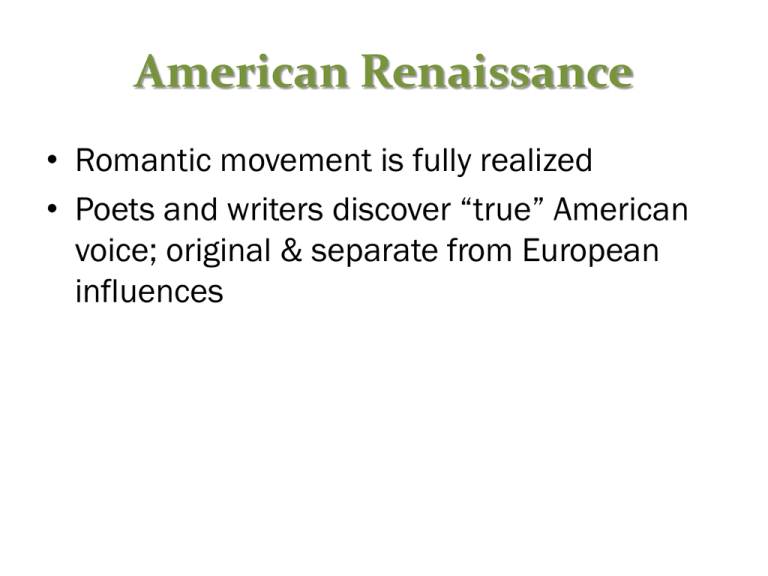
American Renaissance • Romantic movement is fully realized • Poets and writers discover “true” American voice; original & separate from European influences American Renaissance Transcendentalism ROMANTICISM 1800 – 1860 1) Intuition 2) Inspiration from Nature 3) Imagination 4) Inner Experience 5) Innocence All 5 I’s of Romanticism are related to the importance of the individual TRANSCENDENTALISM 1840 - 1860 • Romanticism to the extreme • Emphasis on intuition (inner sense) Transcendentalism • Nurtured by intellectual and social growth in New England • Believed in human perfectibility and worked toward utopia • Believed everything reflects Divine Soul (kind of like God, but not necessarily the Puritan god…more like nirvana) • Intuition is key to truth…nature is important as a way to get in touch with intuition Transcendental Thought Paraphrase each ideal. • Nonconformity • Self-reliance • Free thought • Confidence • Importance of nature Ralph Waldo Emerson • Led Transcendentalism – Ideal state of being is to “transcend” or rise above earthly concerns – To achieve this goal, individual must seek spiritual, not material, greatness and the essential truths of life through intuition 5-Minute Discussion Share your thoughts with a neighbor. – How are you affected by nature? Do you find comfort in it? Do you reflect the moods of nature? – What does it mean to know something intuitively? For example, has a parent or a sibling ever known something was wrong with you without having talked with or seen you? What do we mean when we say "I just know it"? – How do you demonstrate that you are an individual? Do you think independently of others or do you follow the crowd? “Self-Reliance” (225) Ralph Waldo Emerson • Paragraph 1: – What does Emerson mean when he says, “envy is ignorance” and “imitation is suicide”? – What does he say about “power” and “work”? – Paraphrase this sentence: “The eye was placed where one ray should fall, that it might testify of that particular ray.” “Self-Reliance” (225) Ralph Waldo Emerson • Paragraph 2: – How is trust a part of being self-reliant? – Emerson instructs us to “accept the place the divine Providence has found” for us. Do you agree? Why or why not? – How is acceptance different than complacence? “Self-Reliance” (225) Ralph Waldo Emerson • Paragraph 3: – Why does Emerson see society as the enemy of individuality? – What is the role of nonconformity? What does that word mean to Emerson? “Self-Reliance” (225) Ralph Waldo Emerson • Paragraph 4: – What makes a man (in Emerson’s view)? – Connect this quote to something we’ve read previously: “Nothing is at last sacred but the integrity of your own mind.” “Self-Reliance” (225) Ralph Waldo Emerson • Paragraph 5: – What is a hobgoblin? – What is a “foolish consistency”? – How does it get in the way of genius? “Self-Reliance” (225) Ralph Waldo Emerson Working in groups, identify 1 example for at least 3 types of Transcendental thought and record on your chart. 1) Matt, Sarah, Ty 2) Keith, Anthony, Julian 3) Mitch D., Andy, Taylor 4) Mitch F., Kyle, Cody 5) John, Stina, Andrew, Rachel 6) Wesley, Makenna, Aaron 7) Keane, Landon, Caroline, Haley 8) Amon, Chris, Killian 9) Bethany, Jake, Alexis 10) Annie, Dallin, Haley “Self-Reliance” (225) Ralph Waldo Emerson Working in groups, identify 1 example for at least 3 types of Transcendental thought and record on your chart. 1) Jordan A., Chip, 2) Bryce, Riley, Briana Jackson 3) Rachel, Will, Tyler S., Brock 4) Samantha, Taylor, Billy, Ryan 5) Andrew, Tyler F., Tori 6) Ty, Susan, Austin, Sarah 7) Peyton, Taegen, Morgan 8) Tobias, Jordan R., Summer 9) Kendall, Che, Kyle The search for identity is a common thread in American literature. It is expressed in through three typical topics: American Dream American Journey American Hero •Quest for increased status and success and/or personal fulfillment •How do we try to improve our lives? •How a person or character changes or develops physically, mentally (psychologically), or emotionally (spiritually) •How do we change? •An individual who finds himself or herself; usually a common person; may be a tragic hero; may be heroic through action or through selfunderstanding •How do we achieve our goals? Themes of American Literature

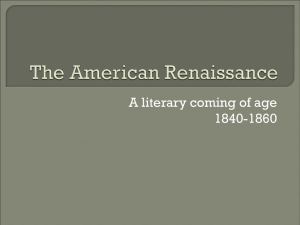
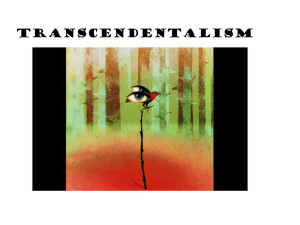
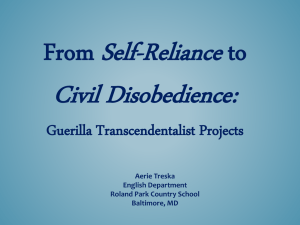
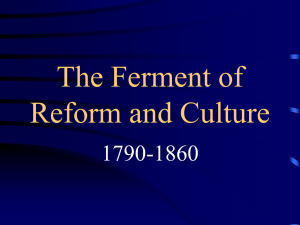

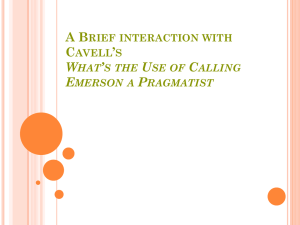
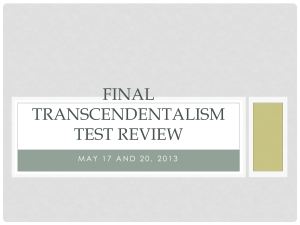
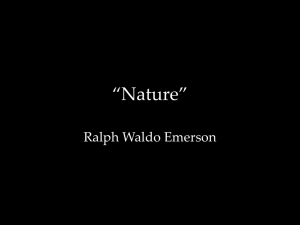
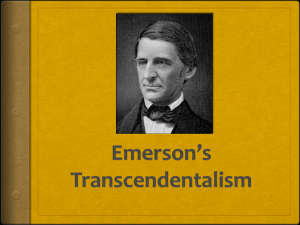

![“The Progress of invention is really a threat [to monarchy]. Whenever](http://s2.studylib.net/store/data/005328855_1-dcf2226918c1b7efad661cb19485529d-300x300.png)